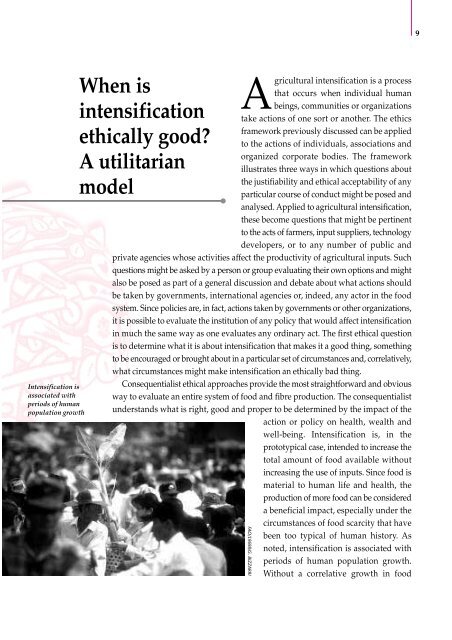9<strong>Intensification</strong> isassociated withperiods <strong>of</strong> humanpopulation growthWhen isintensificationethically good?A utilitarianmodel<strong>Agricultural</strong> intensification is a processthat occurs when individual humanbeings, communities or <strong>org</strong>anizationstake actions <strong>of</strong> one sort or another. The ethicsframework previously discussed can be appliedto the actions <strong>of</strong> individuals, associations and<strong>org</strong>anized corporate bodies. The frameworkillustrates three ways in which questions aboutthe justifiability and ethical acceptability <strong>of</strong> anyparticular course <strong>of</strong> conduct might be posed andanalysed. Applied to agricultural intensification,these become questions that might be pertinentto the acts <strong>of</strong> farmers, input suppliers, technologydevelopers, or to any number <strong>of</strong> public andprivate agencies whose activities affect the productivity <strong>of</strong> agricultural inputs. Suchquestions might be asked by a person or group evaluating their own options and mightalso be posed as part <strong>of</strong> a general discussion and debate about what actions shouldbe taken by governments, international agencies or, indeed, any actor in the foodsystem. Since policies are, in fact, actions taken by governments or other <strong>org</strong>anizations,it is possible to evaluate the institution <strong>of</strong> any policy that would affect intensificationin much the same way as one evaluates any ordinary act. The first ethical questionis to determine what it is about intensification that makes it a good thing, somethingto be encouraged or brought about in a particular set <strong>of</strong> circumstances and, correlatively,what circumstances might make intensification an ethically bad thing.Consequentialist ethical approaches provide the most straightforward and obviousway to evaluate an entire system <strong>of</strong> food and fibre production. The consequentialistunderstands what is right, good and proper to be determined by the impact <strong>of</strong> theaction or policy on health, wealth andwell-being. <strong>Intensification</strong> is, in theprototypical case, intended to increase thetotal amount <strong>of</strong> food available withoutincreasing the use <strong>of</strong> inputs. Since food ismaterial to human life and health, theproduction <strong>of</strong> more food can be considereda beneficial impact, especially under the<strong>FAO</strong>/19698/G. BIZZARRIcircumstances <strong>of</strong> food scarcity that havebeen too typical <strong>of</strong> human history. Asnoted, intensification is associated withperiods <strong>of</strong> human population growth.Without a correlative growth in food
10THE ETHICS OF SUSTAINABLE AGRICULTURAL INTENSIFICATIONsupplies, food scarcity causes hunger, disease and starvation. Using the frameworkpreviously described, many individuals and groups consider options and undertakeconduct that has the outcome (consequence) <strong>of</strong> increased food supply. The benefitsassociated with increased food availability provide the elemental argument forintensification, and this argument is consequentialist in its moral logic. In the simplecase where new technology or farming methods allow a farmer or landowner toproduce more food, consequential reasoning shows why this is ethically a good thing.As already stated, European agricultural intensification immediately prior to theIndustrial Revolution was accomplished not only by applying a package <strong>of</strong> newproduction technologies to farming, but also by the Enclosure Acts, whichdisestablished a system <strong>of</strong> rights and duties that permitted commoners to live on andfarm lands as long as their crops were shared according to an ancient formula. Theframework applies not only to the conduct <strong>of</strong> individual farmers and landowners, butalso to the political activity that led to this policy change. Was enclosure ethicallyjustifiable? The British philosopher John Locke (1632-1704) posited the followingargument to show that it was:… He that encloses land, and has a greater plenty <strong>of</strong> the conveniences <strong>of</strong> life fromten acres, than he could have from an hundred left to nature, may truly be said togive ninety acres to mankind; for his labour now supplies him with provisions out<strong>of</strong> ten acres, which were but the product <strong>of</strong> an hundred lying in common. 1Here the disestablishment <strong>of</strong> the old system <strong>of</strong> commoner rights and duties isportrayed as justified in light <strong>of</strong> the increased benefits (conveniences) accruing fromenclosure. Although this style <strong>of</strong> thinking is not typical <strong>of</strong> Locke, the passage impliesthat any system <strong>of</strong> rights and privileges is justified, given the efficiency with which itsupplies human beings with provisions.Efficiency is particularly important in the most common form <strong>of</strong> consequentialism,utilitarianism. Utilitarians assume that the values associated with consequences can bequantified to produce a ranking system for all possible courses <strong>of</strong> action (or options)available to an agent. They also assume that the value <strong>of</strong> benefits and harms can beadded and subtracted. Such a ranking system produces a class <strong>of</strong> optima such that nooption in the opportunity set yields greater total value (although there may be more1 J. Locke. 1690. Second treatise <strong>of</strong> Government. In C.B. McPherson, ed. 1980. Indianapolis, USA, Hackett Publishing.Locke’s philosophy is not consequentialist, but contractarian. He believed that people had a natural right to appropriategoods (including land) found in nature, and that others had a duty to respect this property right, which was grounded bothin the nature <strong>of</strong> things and in the social contract forming the basis <strong>of</strong> civil society. It is thus likely that he understood thephrase “give ninety acres to mankind” in an almost literal sense, and saw the justification <strong>of</strong> enclosure in terms <strong>of</strong> a kind<strong>of</strong> expansion <strong>of</strong> the commons, rather than in starkly utilitarian terms. Nevertheless, it is difficult to interpret this particularpassage as anything more than a consequentialist moral argument.
















